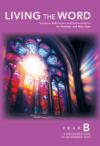Scripture Study for
Seventh Sunday of Easter
Acts 1:12–14 / Psalm 27:13 / 1 Peter 4:13–16 / John 17:1–11a
<< Back to LECTIONARY RESOURCES
Understanding the Word
By Br. John R. Barker, OFM
At his ascension, Jesus had ordered the apostles to remain in Jerusalem to await their baptism by the Holy Spirit (1:4–5). Now they return to Jerusalem just across the Kidron Valley from Mount Olivet—no further than a Jew was allowed to walk on the Sabbath. It is characteristic of Acts that Jesus’ followers pray together at important moments, as they do here. The presence of the women, including the mother of Jesus, underscores the important role that women will continue to play in Luke’s account. The list of the eleven apostles (minus Judas Iscariot) sets the stage for his replacement in the following passage (1:15–26).
Peter exhorts his audience to make sure that if they suffer, it is for the right reason. As he has already pointed out several times, Christ himself suffered, and so it is to be expected that his followers will, too. Yet as long as they are being insulted or suffering for the name of Christ, they have cause to rejoice, for his experience of glory will be theirs, too. Not all suffering is cause for rejoicing, of course, but only unjust suffering. Suffering as a result of grievous sin, of course, does not reflect the suffering of Christ, and so does not lead to glory.
In his prayer to the Father at the Last Supper, Jesus states a central theme of John’s Gospel: eternal life consists in knowing the Father and the Son he sent. Jesus has given glory to God by making the Father known on earth. Now he asks the Father to give him the glory he already possesses as the Word who came into the world (1:1–14). As the Prologue states, that world did not receive the Word; Jesus affirms here that only those whom God had given him “out of the world” believed in him. The world here means those aspects of human reality that are opposed to God. This is why Jesus does not pray “for the world,” which is implacably opposed to him, but only for those who have believed in him and whom he now leaves, for the time being, in the midst of that hostile world.
